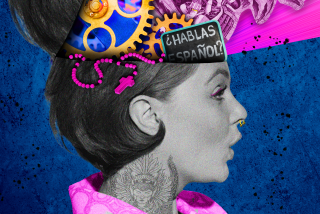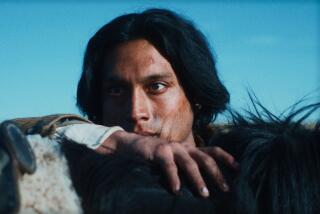NONFICTION - June 28, 1992
- Share via
FRONTIERS: The Epic of South Africa’s Creation and the Tragedy of the Xhosa People by Noel Mostert (Knopf: $35; 1355 pp.). Sophocles himself could not have illustrated Western sin any better than the tragic encounter between South Africa’s indigenous Xhosa tribe and European settlers in the 19th Century.
Archetypal innocents, the Xhosa (pronounced KO-saw ) centered their peaceful, democratic society around their beloved cattle. “Life literally circled around them,” Mostert writes, “since the huts of an umzi were grouped in a semi-circle around the cattle kraal , with their entrances facing it. The direction was eastwards, towards the sun. For every Xhosa, the first sight as he rose and emerged from his hut was of his beloved beasts, glowing in the rising light.”
Paradise was lost, however, when (mostly British) settlers began seizing their Xhosa lands and betraying Xhosa leaders. In their frustration, the Xhosa found hope in the prophecy of Mlanjeni, a young man who sat neck-deep in a pool from which he seldom emerged. Destroy your food stocks and kill your cattle, he counseled, and the white man will go away. It was the Xhosa, however, not the whites, who went away: Between January and December of 1857, death brought their population down from an estimated 105,000 to 37,500.
Real-life tragedy, of course, is never as morally clear-cut as the Sophoclean sort, a fact that Mostert underlines through 1,355 pages of qualifications, digressions and background. His attempt at thoroughness is not entirely successful: In some areas the detail is excessive (e.g., a digression about the past two million years of drought and rain in the Sahara) and in others, insufficient (e.g., in claiming that 19th-Century tribal enmities demystify the modern-day conflict between Xhosas such as Nelson Mandela and Zulus such as Chief Mangosuthu Buthelezi, he neglects the economic bases of the feuding). But Mostert’s final analysis that the Xhosa were not simply “good” (they punished victims with giant ants and red-hot stones, for one thing) and the settlers not entirely “evil” (they saw in the continent “Genesis made visible; the wildest, the original waste of all”) has all the moral complexity of “Black Robe,” Brian Moore’s novel about another meeting between European and ancient cultures.
More to Read
Sign up for Essential California
The most important California stories and recommendations in your inbox every morning.
You may occasionally receive promotional content from the Los Angeles Times.










